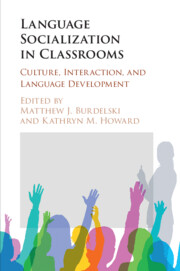Book contents
- Language Socialization in Classrooms
- Language Socialization in Classrooms
- Copyright page
- Dedication
- Contents
- Figures
- Tables
- Contributors
- Acknowledgments
- Transcription Conventions
- 1 Introduction
- Part I Socializing Values, Dispositions, and Stances
- 2 Interactional Contingencies and Contradictions in the Socialization of Tolerance in a Spanish Multicultural School
- 3 Shaping Sikh Youth Subjectivities in a US Gurdwara
- 4 Affective Stance and Socialization to Orthodox Christian Values in a Russian Heritage Language Classroom
- Part II Socializing Identities
- Part III Language Socialization and Ideology
- Part IV Conclusion
- Index
- References
2 - Interactional Contingencies and Contradictions in the Socialization of Tolerance in a Spanish Multicultural School
from Part I - Socializing Values, Dispositions, and Stances
Published online by Cambridge University Press: 10 February 2020
- Language Socialization in Classrooms
- Language Socialization in Classrooms
- Copyright page
- Dedication
- Contents
- Figures
- Tables
- Contributors
- Acknowledgments
- Transcription Conventions
- 1 Introduction
- Part I Socializing Values, Dispositions, and Stances
- 2 Interactional Contingencies and Contradictions in the Socialization of Tolerance in a Spanish Multicultural School
- 3 Shaping Sikh Youth Subjectivities in a US Gurdwara
- 4 Affective Stance and Socialization to Orthodox Christian Values in a Russian Heritage Language Classroom
- Part II Socializing Identities
- Part III Language Socialization and Ideology
- Part IV Conclusion
- Index
- References
Summary
This chapter analyzes daily interactions between teachers and students in a special Performance Arts program at a Spanish school designed to foster inclusion and intercultural friendships. Focusing on interactions in which Spanish children exclude their Moroccan peers and/or overtly refuse to participate with them in activities, it describes how teachers respond to these moments that directly challenge the goals of the program. The analysis considers such instances in which students’ behaviors create a disruption of program activities in relation to examples of exclusion in other pedagogical contexts of the school that were rarely noticed and recognized by teachers as actual forms of exclusion.The chapter deepens our understandings of how the emergent nature of everyday classroom interaction can contradict and undermine efforts to overtly socialize culturally contested values, or those that are publicly valorized as good and desirable but simultaneously challenged, and even often covertly constructed as problematic. The findings have implications for teachers in institutions that increasingly find themselves having to negotiate the politics of inclusion and diversity.
- Type
- Chapter
- Information
- Language Socialization in ClassroomsCulture, Interaction, and Language Development, pp. 29 - 48Publisher: Cambridge University PressPrint publication year: 2020
References
- 2
- Cited by

